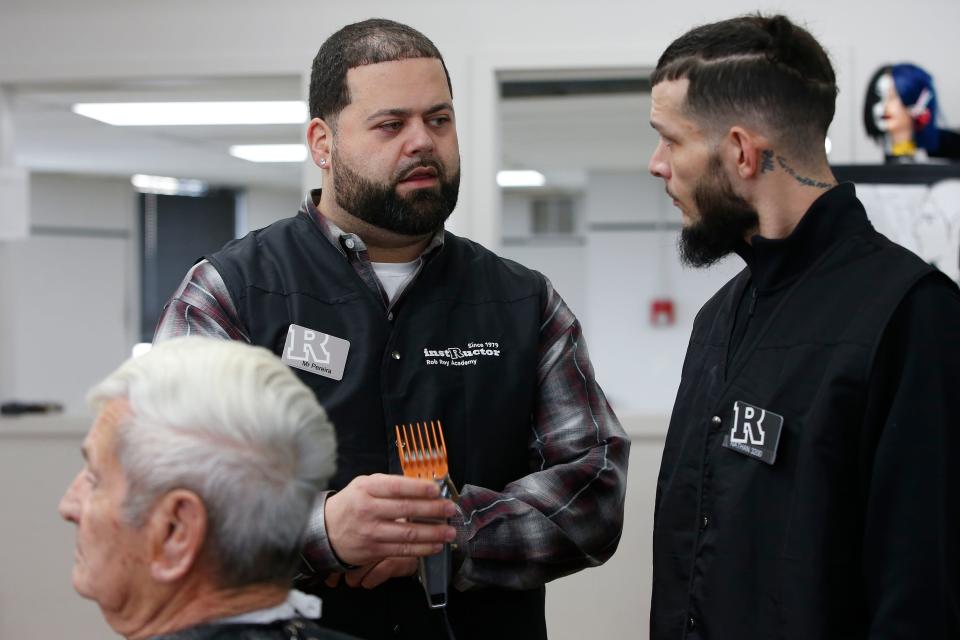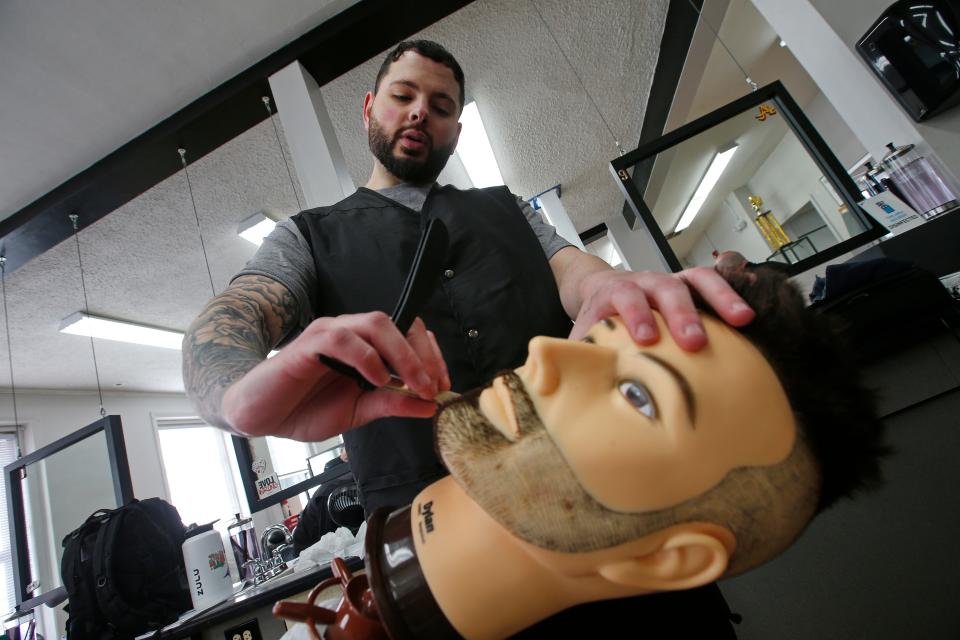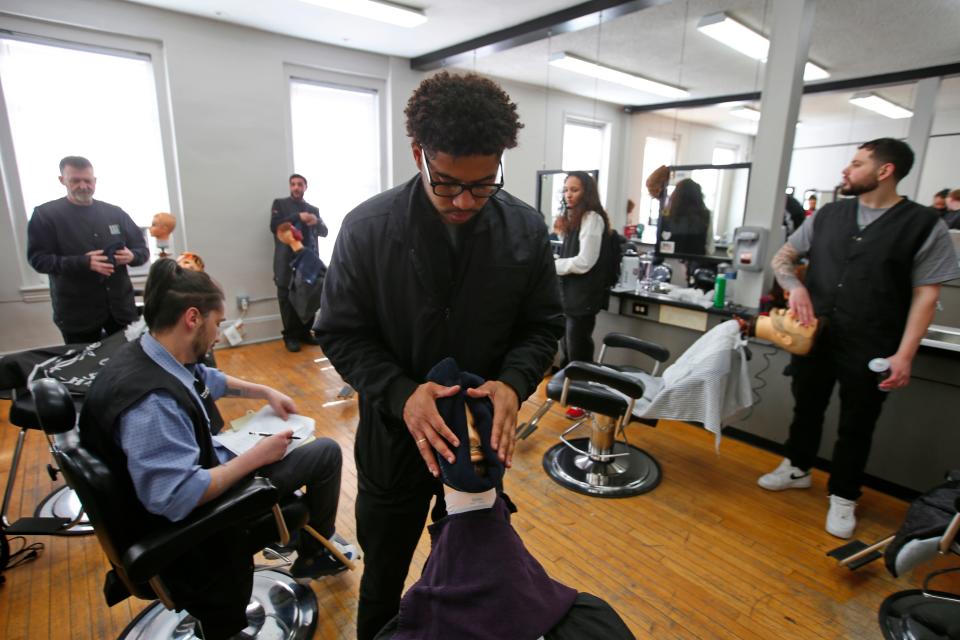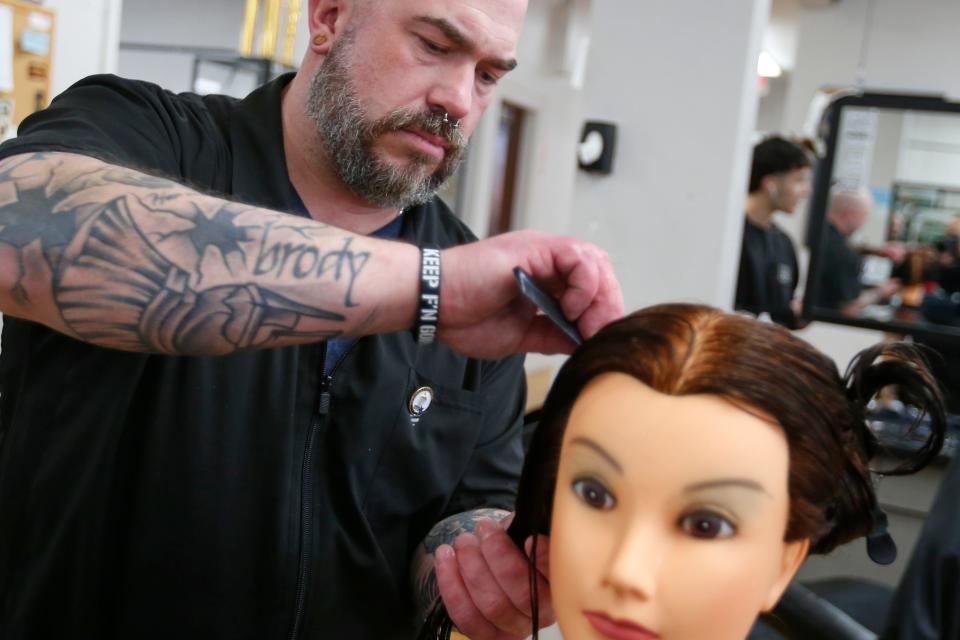New Bedford hair care professionals say now is the time to get in the field. Here's why.
NEW BEDFORD — Out of all the business-types that closed down for stretches of time near the start of the COVID-19 pandemic in 2020, businesses deemed to be "close contact personal services" like salons and barbershops were among those considered particularly risky for viral spread.
"I still remember the last client I did that day," said New Bedford hairstylist and salon owner Jennifer Ferreira of the day in March 2020 when then-Governor Charlie Baker ordered non-essential businesses to shut down. What followed were months of speculation and moving targets, as officials tried to gain an understanding of COVID-19 and how it spreads, adjusting temporary safety measures as they went.
Ferreira — who now owns J Glam Hair Studio, 651 Orchard St. — says all of her colleagues in salons and similar businesses will remember the stretch of worklessness as a very long 10 weeks, with most initially unable to collect pandemic unemployment benefits due to their 1099 tax status. Then, for many who owned those types of businesses at the time, it was an upending of their life's work, Ferreira said.
"A lot of these businesses just were not able to come back from that," Ferreira said. "And it's sad because a lot of those that closed were ones that had been open for so many years."
According to data from the Mass. Office of Consumer Affairs and Business Regulation (OCABR), the combined number of licensed salons and barbershops in Massachusetts in 2020 was 14,650, with numbers appearing to have been relatively consistent in the years leading up.
In 2021, that number dropped to 11,293 — a reduction of 3,357.

Four years later, challenges — and hope — remain
Newer data shows the industries haven't exactly bounced back, with a current total of 11,272 Massachusetts salons and barbershops. However, industry professionals seem to agree that fewer establishments doesn't mean fewer jobs.
Stay current: New Bedford police officers could soon be donning body cameras, contract before council
New Bedford barber Sean Almeida — manager of Vega's Barber Club, 507 Kempton St. — says finding licensed barbers is "absolutely" an industry-wide challenge. At his shop, Almeida said three of six barber stations have sat unfilled for the better part of the past year.
Then, within the scarcity of licensed barbers for hire, Almeida says the pool of actually viable candidates is smaller yet.
"I think a lot of times, kids are going to barber school right out of high school on behalf of their parents wanting them to do something," Almeida said, "so they picked this because they think it's trendy or whatever, but they don't have a passion for it so they don't last."

In New Bedford, Almeida says transportation is also a factor, as in some cases, would-be barbering students have no way to get to the nearest barbering school, his alma mater, Rob Roy Academy in Fall River.
"New Bedford would probably do well with its own barber school," he said.
Aside from staffing challenges, Ferreira said COVID and the economic events that followed have led to some strains for those in hair care fields, but not enough to render the work unsustainable.
"The cost of supplies rose tremendously during the pandemic, and they've just continued to go up since then," she said. "And with the world the way it is now, people are spending less money, less often. The holidays are usually very busy — I've noticed a little decline there. But I'm still here; this is still paying my bills. At the end of the day people still want to look and feel good."
Make your spring plans!: Get egg-cited for Easter: Here's where you can hunt for eggs on the SouthCoast.
"People are very routine in their ways — you have your quarterly guy who comes in four times a year, your two-weekers, your one-weekers — and COVID, I think, messed up those routines a little," Almeida said. "But I've found consistency is everything. My best ability is availability."
SouthCoast's lone barber school unharmed by COVID
At Rob Roy Academy — which has five locations, including a New Bedford site that does not include the barbering program — students can complete the education programming needed for licensing eligibility in a number of areas. Aside from barbering, these include manicuring, esthetics, and cosmetology. The latter is the type of license needed to be a stylist in a traditionally women-aimed hair salon, however it also covers some manicuring and barbering basics.

"Right now there are more positions available than there are people to fill them," said Rob Roy CEO Tracy Casey.
While COVID has had a lasting impact on the fields the school feeds, Casey says Rob Roy's enrollment levels have remained relatively stable.
"Looking back now, we lost very few students. It took many of them so much longer to complete than they ever would have had the pandemic not happened but overall we didn’t see a huge decline," Casey said, noting courses were able to resume via remote learning before the return of in-person school.
If the pandemic did affect enrollment, Casey said it's been in the form of a shift in when people decide to enroll.
"September and January used to be the two largest starts of the year and now we see more consistent enrollments throughout the year," she said. "We also saw a lot of people after the pandemic that wanted to come to school because they realized that they were in jobs they did not like and the pandemic taught them that life is short.... They wanted to follow their passion."

Thinking outside the booth
Ferreira — who at one time, pre-COVID, owned a much larger salon — says the cozy, two-chair J Glam Hair Studio, opened about a year ago, is the ideal scale for her current lifestyle, allowing her the freedom she wants while also making a comfortable living.
"At this point in my career, this is a perfect fit," she said.
But while small salon ownership is her perfect fit, Ferreira says it's important to remember that working in or owning hair care businesses aren't the only outcomes for those licensed in those fields.
"There's so much you can do with your license that the possibilities are endless," Ferreira said, noting some students go on to earn multiple license types. "You can do runway and fashion shows, you can go on to teach, be a distributor, be on movie sets.... If it's your calling, you'll always have work to do."
Read the latest local news: Shellfishing in New Bedford Harbor to be further limited due to overflow from plant
"For anybody looking to get into barbering, now is the time," said New Bedford barber Chris Medeiros, who works at Kustom Blendz Barbershop, 1865 Acushnet Ave.
As for why, Medeiros says one reason is that social media and the internet have opened up many doors for barbers to not only promote themselves using platforms like YouTube, but in some cases benefit in other ways.
"Not only does that get you more clientele, but if the channel takes off you can get sponsored, companies might send you clippers to try out and review," he said, "and at the same time you're still making money cutting hair."
Medeiros says for him, barbering has been something of a saving grace in his life, calling it "pretty much" the only legitimate job he's had. After serving time in prison, Medeiros said he decided to commit to barbering as a career path and hasn't looked back since.
"It transformed my life 100%. It took me off the streets, changed my whole mentality," he said.
Through the years
Number of licenses held for Mass. salons:
2019: 11,912
2020: 12,780
2021: 9,616
2022: 10,893
2023: 9,937
Current: 9,597
Number of licenses held for Mass. barbershops:
2019: 1,740
2020: 1,870
2021: 1,674
2022: 1,865
2023: 1,733
Currently: 1,675
— Mass. Office of Consumer Affairs and Business Regulation
This article originally appeared on Standard-Times: New Bedford hair professionals say jobs are plenty 4 years after COVID
